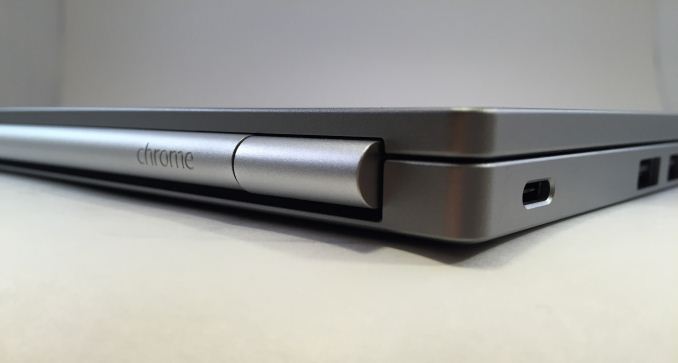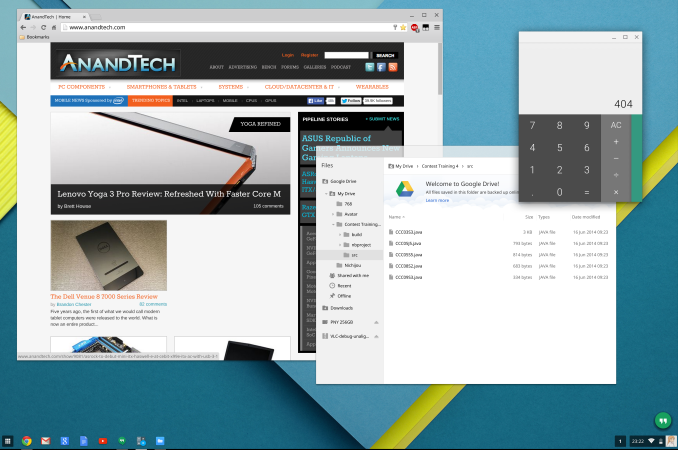The Chromebook Pixel (2015) Review
by Brandon Chester on March 16, 2015 8:00 AM EST- Posted in
- Laptops
- Chrome OS
- Chromebook
- Chromebook Pixel
Final Words
Despite its limitations, it's really hard to not like the Chromebook Pixel. Google has clearly put a lot of thought and effort into designing it, and what it does do it does really well. I think the move to USB Type-C is forward thinking, and makes the Pixel very versatile when it comes to connecting to both current and future displays and peripherals. The little details like tapping the top to see the remaining battery capacity, and the ability to charge on either side also help make it a very lovable laptop.
The Pixel's hardware is top notch. The build quality is every bit as good as what you'll get on a MacBook Retina, and both the keyboard and touchpad are comfortable to use. The CPU and RAM are completely overkill for running Chrome OS, but given that the Pixel has absolutely stellar battery life I'm not complaining about the additional hardware power. I think Google could have done more to calibrate the display, but in all honesty I doubt any users who buy the Pixel will be bothered by it, and it is still incredibly sharp.
The only big criticism I can really throw at the Pixel is the fact that its software is limited. But that is the entire point of how Chrome OS has been designed, and I do not know if it really makes sense to complain about something doing exactly what it was intended to do just because you wish it could do more. Chrome OS is definitely not the OS for everyone though, and although you can run other versions of Linux overtop, it's not exactly a real solution to the problem.
The final question is obviously whether or not someone interested in the Pixel should buy one. The answer is more complicated than a yes or a no. For anyone who wants to develop with Chrome OS in mind, the Pixel is the laptop to buy if it is within their budget. Other Chromebooks are definitely more affordable, but the Pixel is just so much nicer than any other Chromebook. I think that the Pixel can also be an appealing device for any user who can work within the limitations of Chrome OS, although I heavily stress that buyers make sure they know exactly what those limitations are before they spend $1000 on a laptop.
Google clearly doesn't intend for the Pixel to be a mass market item. It's quite expensive, it runs Chrome OS, and it's only sold in the US and the UK. There's clearly a small market for people that want a laptop like the Pixel though, and those are the people that Google are targeting. I am not one of them, and I do not know many people who are, but they do exist. In the end I find myself wishing that the Pixel could do more, because it's a genuinely nice laptop. I really like the Chromebook Pixel, but I personally just couldn't justify buying it.












123 Comments
View All Comments
chlamchowder - Monday, March 16, 2015 - link
But since you have a Windows machine already, why spend the extra money on a Chromebook when that machine can already cruise the internet (and more)?It's like having a car, and then buying another car...
Hanoveur - Monday, March 16, 2015 - link
Okay, I'll drag my desktop PC downstairs just to cruise the web when I'm watching TV. That makes sense.steven75 - Wednesday, March 18, 2015 - link
Or replace the desktop with one real $1,000 laptop like everyone else?Hanoveur - Wednesday, March 18, 2015 - link
I guess I don't want to be like everyone else since I build my own PCs.coder543 - Monday, March 16, 2015 - link
I disagree with that comment, but sure, believe whatever you want to about Chrome OS.For 95% of consumers, an iPad is all they need for their daily computational lives. They literally *Do not* need a full computer. A Chromebook is like an iPad with a keyboard, USB ports, and flash player. It really is good enough for the majority of consumers. For the people who need more, Crouton allows you to easily have access to a true Linux desktop environment in parallel with ChromeOS -- switching between them with a keyboard shortcut. Full Linux is sufficient for anyone who doesn't require exact pieces of specialized software, which is the vast majority of people. They may have preferences for pieces of software, but there are Linux equivalents that are awesome in most cases.
So, no, this is not a toy computer, and no, you don't "need" to own a real computer in addition to it.
I really wish it had more storage by default -- that is a fair criticism. Everything about this device is justifiable except that, which is just a poor decision by Google.
chlamchowder - Monday, March 16, 2015 - link
The storage limitation is justifiable if it's used as a thin client.What turns me off is that it is a thin client. It's expensive and/or difficult to get a very high speed internet connection. ISPs in the US just aren't that good. When traveling, it might even be impossible (and Chromebooks are laptops/ultrabooks...see where the problem is?). But that's how it was designed.
andychow - Monday, March 16, 2015 - link
That's why I love it. I don't understand people "only 32GB". Really? That sounds overkill. Under normal circumstances, it's a device you will never store any files on.It's a thin client, but a nice one with no lag, a nice screen and great battery life. I'm getting one to replace my other chromebook.
Hanoveur - Monday, March 16, 2015 - link
I use a Synology NAS as extra storage for all the computers in my home, including my Chromebook. I have my own private cloud. But then again, some people are digital packrats...they want to make sure they have terabytes of movies and music with them at all times for some strange reason...and then they lose their devices and media. Not to mention the amount of time they spend transferring it all.ppi - Monday, March 16, 2015 - link
Cloud storage (even home NAS) will not save you if you are on the travel. Especially in Europe - imagine you go with family skiing to Austria, and you want to have along some movies for your kids. Data roaming is insanely expensive (think €50 for 10MB data) and WiFi in hotels or rented apartments is not standard either.Also, i7 on a device that can do only as much as Chromebook is a waste. Core-M would be more appropriate.
cjb110 - Tuesday, March 17, 2015 - link
your skiing in Austria and you take a laptop with you? why? who cares what laptop is? The scenario you've invented makes little sense for any laptop Windows, Apple or Google.